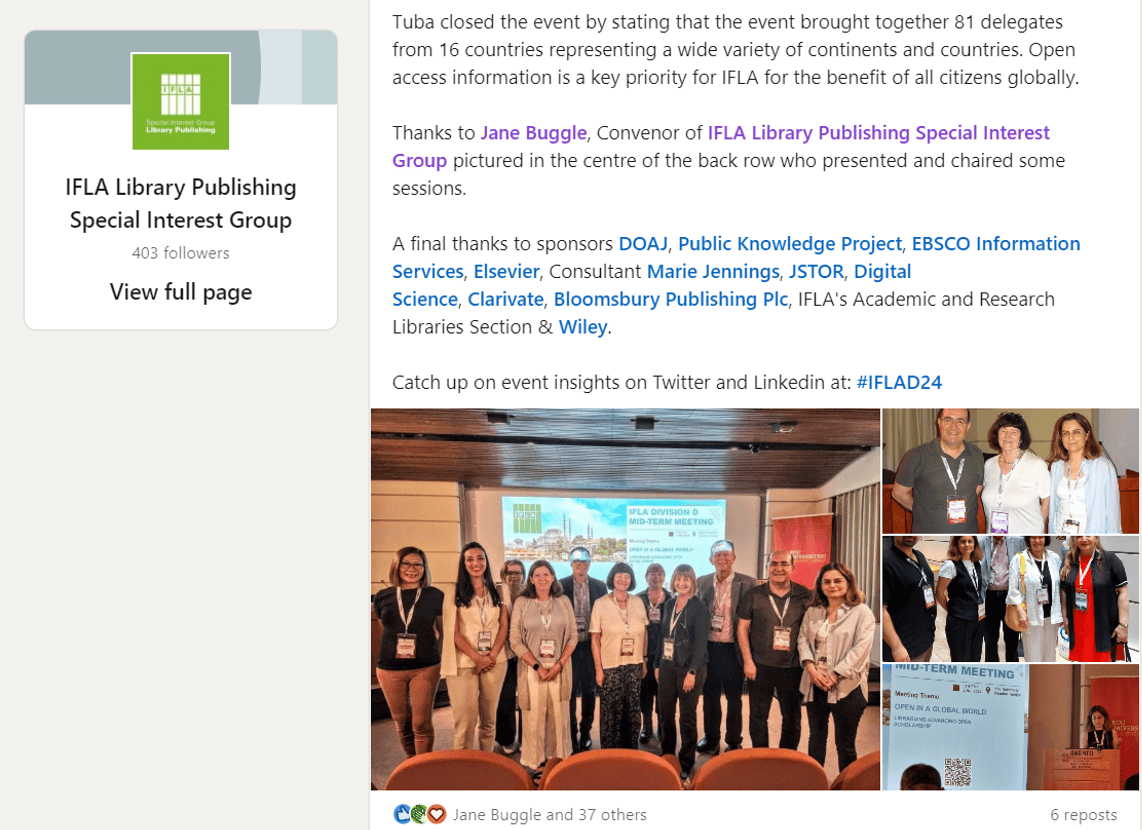Taking Libraries into the Future, Part 4: How IFLA Harnesses Social Media
How can social media effectively support library publishers? This week, our expert comes straight from the International Federation of Library Associations and Institutions (IFLA) to share valuable insights on using platforms like X and LinkedIn to connect with the global library community.
Did you know? Taking Libraries into the Future is also a quarterly webinar series for academic librarians. Learn more here.
Taking Libraries into the Future is back! This time for our third and final post on how academic libraries are making the most of social media. We interviewed Marie O’Neill Maher, who is the originator and co-founder of the MSc in Information and Library Management at Dublin Business School, which is accredited by the Library Association of Ireland. She is currently enrolled on a part-time PhD in Librarianship at University College Dublin on the subject of open access scholarly publishing. She is a member of the Executive Board of the All Ireland Journal of Higher Education (AISHE-J) and a Committee Member of the IFLA Special Interest Group on Library Publishing.
We are extremely grateful to Marie for the care she has taken in detailing how IFLA uses social media and also to Ann Okerson, Chair of IFLA D Division, who has read the piece and endorsed it. As always, the interview was conducted by Gold Leaf‘s Linda Bennett.
Linda Bennett: If you use social media as part of your strategy, how do you engage with it?
Marie O’Neill Maher: Social media is a crucial component of promotional activities conducted by the IFLA Special Interest Group on Library Publishing (IFLA LibPub SIG). X remains the SIG’s most popular platform. Established in September 2020, the SIG’s X page has garnered over 1000 followers from the library, library publishing and open science community globally. The number of followers continues to grow exponentially. In November 2023, the SIG launched a LinkedIn page, which in a short space of time has attracted nearly 400 followers from across the library publishing and open publishing communities worldwide.
IFLA LibPub SIG’s social media platforms serve as a conduit for disseminating information about newly released resources, guidelines and events, whilst also providing a platform to highlight significant developments within the global library publishing community, including the work of individual professionals, publishing programs and relevant organizations.
“It is just as important to follow individuals and organisations as it is to attract new followers.”
Developments that have attracted extensive engagement on the SIG’s social media pages include the launch of the SIG’s Global Library Publishing Map, the SIG’s participation in the World Library Congress 2023 in the Netherlands including the subsequent publication of Conference Proceedings, and IFLA Division D’s recent Midterm Event at Koç University in Istanbul. To catch up on the Midterm Event which took place 5-7 June, see the hashtag #IFLAD24 on X and LinkedIn. See also an example of a LinkedIn post about the event.

A key indicator of the success of the SIG’s social media platforms is the wide response they have elicited from organizations such as DIAMAS, DOAJ, the Open Institutional Publishing Association, OASPA, Science Direct, the Library Publishing Coalition, Educopia, scholarly communication librarians, library publishers and library staff in both the Global North and South.
LB: Do you feel that some of the adverse publicity social media has encountered recently detracts from its value, or is it still a very powerful marketing tool?
“Posts that share valuable resources, guidelines, and professional development opportunities tend to generate the most reaction.”
MNM: Library publishers primarily employ diamond open access publishing approaches, which produce high-quality scholarship that is free to publish and free to read. The open access movement has a significant presence on X, making it challenging for the SIG to disengage from the platform. Consequently, both X and LinkedIn remain powerful marketing tools for the SIG. Whilst not ideal, it is crucial to acknowledge the positive manner in which X amplifies the importance of open access and open science, which are key strategic priorities for the IFLA and for the betterment of society. IFLA provides social media guidelines which are extremely important in terms of fostering a culture of respect on IFLA LibPub platforms also respecting copyright and intellectual property.
It is important to continually evaluate and assess social media platforms to ensure that they effectively cater to the needs of one’s user community. IFLA LibPub has focused primarily on Twitter and LinkedIn due to followers’ more limited interest in the Facebook, Instagram and Mastodon platforms.
LB: From your experience, which types of contact do librarians most value? What are they responsive to? Or is it a case of using a range, as different people respond in different ways? Since librarians are always very busy, how is it best to engage with them without eating too much into their time?
MNM: Engaged in a niche but rapidly expanding form of scholarly communication, library publishers resonate with posts that have a tangible impact on professional practice. Posts that share valuable resources, guidelines and professional development opportunities tend to generate the most reaction. Tweets featuring compelling visuals or multimedia content, such as posters, photos or video content, are also appealing. IFLA LibPub is an international community of practice. Photos of events and members of this community of practice also attract significant attention. It is important on social media platforms to capture the people whose passion and commitment drives the development of IFLA LibPub, which in turn attracts new members. Utilizing hashtags and tagging followers are also effective strategies for reaching busy professionals.
“Followers particularly enjoy ‘human stories’ from library publishers, who outline the challenges and opportunities of library publishing on the ground.”
LB: Do you use third parties – such as listservs, sites run by professional organizations – to boost your reach?
MNM: IFLA LibPub utilizes a listserv managed by Jane Buggle, Convenor of the IFLA Lib Pub SIG and Ann Okerson, Chair of IFLA Division D. The listserv ensures that that all members, regardless of their social media usage, can stay up-to-date. Additionally, the SIG’s web page on the IFLA website, managed by SIG Committee member Anne Inger Hellekjær, acts as a vital information hub. This page provides access to news, events and event proceedings, making it a valuable resource for SIG members.
The SIG has also collaborated with IFLA’s Academic and Research Libraries (ARL) section to publish a series of popular interviews with library publishers globally. These interviews were shared across the SIG’s social media platforms garnering extensive engagement. SIG followers particularly enjoy ‘human stories’ from library publishers, who outline the challenges and opportunities of library publishing on the ground. The collaboration with IFLA’s ARL Section has helped to further the SIG’s mission and vision. IFLA LibPub has since established its own blog.
“The open access movement has a significant presence on X … whilst not ideal, it is crucial to acknowledge the positive manner in which X amplifies the importance of open access and open science.”
LB: Do you have any key tips for librarian readers of this post planning to use social media?
MNM: To keep abreast of key sectoral and global developments and to acknowledge the impactful work of peers, it is just as important to follow individuals and organizations as it is to attract new followers. Mutual sharing of posts creates a powerful reciprocal social media practice that amplifies key messages for all involved, reaching new and existing followers. This practice not only enhances the visibility of our SIG’s content but also demonstrates professional courtesy supporting a culture of generosity and goodwill that is synonymous with the open access movement.
LB: Marie and Ann, thank you very much indeed for all the fascinating information you have shared in this post. You have concluded our series on social media on a very high note!
You might also be interested in this blog series
[Title image by Google DeepMind/Pexels]
